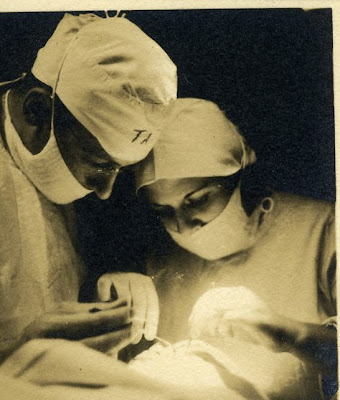



born 14 March, 1910, Berlin--died 8 July, 1995, Hamden, Connecticut
In 1935, my mother Beate Caspari-Rosen received her medical degree, in Berlin. Her marriage to George Rosen was fortuitous for it saved her life. Although born in America, he was not able to gain entry to an American medical school due to his Jewish heritage and his humble background. He, like so many of his City College of New York classmates applied to the famous Berlin medical school and was accepted. It was there that he met Beate (Blessed). Beate was a child of WWI, the terrible aftermath of that war in Germany, its food shortages, hyper-inflation, and street warfare in her neighborhood. To protect their only child from bullets, Beate's parents--her father was a physician-- placed her in a hallway. Deprivation and turnips were her fare. Once a modicum of order was restored she was schooled in a gymnasium, choosing a professional career: to be a physician. Not only was her father a general practitioner but other male family members were too, or specialists. She alone, among the young women in her family--a very large extended one that was largely destroyed in WWII--chose medicine. She excelled in her specialty, ophthalmology. In her various practices, almost all in public or union clinics, she served her patients with patience, authority, and great skill. She was an exemplar of the "good doctor." The elderly would tell her their woes while she carefully corrected or diagnosed their visual deficits and the young received superb care and sympathy.
The pictures I have selected show her operating on an eye; the mirthful curious child; the immigrant in 1935, in the Bronx, where she lived with her in-laws for a time, and finally a picture taken before her departure to the United States. On her passport, she visited for Czarnikow in Poland, undoubtedly knowing that she would never return and be able to see her beloved family again. The visit is stamped in her passport, which survives. Beate's mother's family had a farm and other property in that town, located about an hour from Poznan. She is seen with her grandmother. All members of the family in Poland were exterminated. The houses were looted and the property taken as well. Though my mother expressed delight about visiting Czarnkow/Czarnikau she also related stories that were traumatiizing. Local children threw rocks at her and called her a "dirty Jew." Later she learned that Jewish cemeteries had been desecrated, the cadavers and bones exhumed from their graves, and skulls used for soccer balls. She never returned. My husband, Harold Olejarz [Olarsch] and I visited Czarnkau on our way to Poznan. Our stay was shortened by thunderstorms and the necessity of traveling farther that day. Perhaps more can be learned about the town and its Jewish community from numerous resources on the web.
I will write more about my mother in a different context. For now, the pictures illustrate aspects of her life.
Note: in a "recent post" on the web, "Dr Elizabeth Fee: a historian reaching out to wider audiences."
Interview given to Hochman, G., Benchimol, J., Wegner, L., Azevedo, N., Romero Sá, M. and Martins, R. B.
História, Ciências, Saúde – Manguinhos, v. 13, n.3, p. 83-99, July-Sept. 2006, comments about my mother--and father. Dr Fee is not the author of the essay--it is a transcription of a discussion with her. For the record, my mother's name is spelled Beate NOT Beata. Beate is a not an unusual name in German, and keyrings gan be purchased at stores along with Christophers and Helmuts.
No comments:
Post a Comment